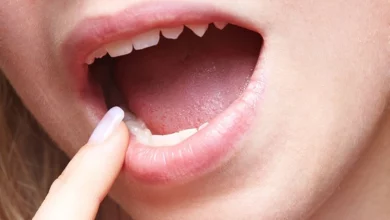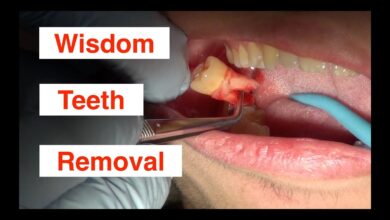Sideways Wisdom Teeth: Causes, Pros, and Cons

Table of Contents
- 1 Sideways Wisdom Teeth: Causes, Pros, and Cons
- 2 Causes of Sideway Wisdom Teeth:
- 3 Pros of Sideway Wisdom Teeth:
- 4 Cons of Sideway Wisdom Teeth:
- 5 What to do next?
- 6 Frequently Asked Questions about Sideway Wisdom Teeth:
- 6.1 Q1: Can sideway wisdom teeth straighten themselves over time?
- 6.2 Q2: Are sideway wisdom teeth always symptomatic?
- 6.3 Q3: Can sideway wisdom teeth be left untreated?
- 6.4 Q4: Do sideway wisdom teeth always need to be extracted?
- 6.5 Q5: Can sideway wisdom teeth cause nerve damage?
- 6.6 Q6: What are the risks of delaying the extraction of sideway wisdom teeth?
- 6.7 Q7: Can orthodontic treatment correct sideway wisdom teeth?
- 7 Conclusion:
Sideways Wisdom Teeth: Causes, Pros, and Cons
Wisdom Teeth, or third molars, are the last teeth to emerge in the back corners of the mouth. While most people experience the normal eruption of wisdom teeth, some individuals may encounter a unique situation where their wisdom teeth grow sideways, known as “sideway wisdom teeth.”
In this article, we will explore the causes, pros, and cons of sideway wisdom teeth, shedding light on this dental anomaly.
Ready, Set, Go!
Causes of Sideway Wisdom Teeth:
- Lack of Space: One of the primary causes of sideway wisdom teeth is inadequate space in the jaw, leading to irregular growth patterns.
- Impaction: Wisdom teeth can become impacted if they are unable to fully emerge due to obstacles like existing teeth or misalignment.
- Genetic Factors: The position and alignment of wisdom teeth can be influenced by genetic factors, meaning individuals may have a predisposition to sideway growth.
Pros of Sideway Wisdom Teeth:
- Reduced Chance of Decay: Sideway wisdom teeth are often difficult to reach with a toothbrush or floss, which may result in less plaque buildup and a reduced risk of tooth decay.
- Lower Risk of Gum Disease: Since sideway wisdom teeth are partially or fully covered by gum tissue, they may be less susceptible to gum diseases like gingivitis.
- Minimal Disruption: Sideway wisdom teeth may cause fewer disruptions in daily activities compared to upright wisdom teeth, which can often cause discomfort and require extraction.
Cons of Sideway Wisdom Teeth:
- Crowding: Sideway wisdom teeth can exert pressure on adjacent teeth, leading to crowding and misalignment of the dental arches.
- Bite Problems: When sideway wisdom teeth interfere with the proper alignment of the jaws, it can result in bite problems such as overbite or underbite.
- Infection and Pain: Partially erupted sideway wisdom teeth can create a breeding ground for bacteria, leading to infection, swelling, and pain.
What to do next?
It is important to consult with a dental professional if you have wisdom teeth growing sideways. They will conduct a thorough examination, including dental X-rays, to evaluate the position, orientation, and impact of the wisdom teeth on your oral health. Based on their assessment, they may recommend one of the following:
1. Extraction:
The most common solution for sideway wisdom teeth is extraction. This prevents further complications, such as infections, damage to neighboring teeth, and ongoing discomfort.
2. Monitoring:
In certain cases, if the impacted wisdom teeth are not causing immediate problems or affecting oral health, your dentist may suggest regular monitoring through periodic check-ups and X-rays.
Frequently Asked Questions about Sideway Wisdom Teeth:
Q1: Can sideway wisdom teeth straighten themselves over time?
A1: No, sideway wisdom teeth cannot straighten themselves. Professional intervention is usually required to address the issue.
Q2: Are sideway wisdom teeth always symptomatic?
A2: Not necessarily. Some individuals may have sideway wisdom teeth without experiencing noticeable symptoms. Regular dental check-ups are crucial to assess their impact.
Q3: Can sideway wisdom teeth be left untreated?
A3: Depending on the individual’s oral health, some sideway wisdom teeth may be left untouched if they are not causing any problems. However, regular monitoring is essential.
Q4: Do sideway wisdom teeth always need to be extracted?
A4: In most cases, sideway wisdom teeth are recommended for extraction due to potential complications and the risks they pose to oral health.
Q5: Can sideway wisdom teeth cause nerve damage?
A5: Yes, in rare cases, sideway wisdom teeth can exert pressure on nerves in the jaw, leading to temporary or permanent nerve damage.
Q6: What are the risks of delaying the extraction of sideway wisdom teeth?
A6: Delaying extraction can increase the chances of complications such as infections, abscesses, damage to adjacent teeth, and increased pain and discomfort.
Q7: Can orthodontic treatment correct sideway wisdom teeth?
A7: Orthodontic treatment may be effective in some cases to correct the alignment of sideway wisdom teeth. However, extraction is often the preferred approach.
Conclusion:
Sideway wisdom teeth can present unique challenges and potential risks to oral health. While they may offer certain advantages like reduced decay and gum disease, the negative consequences such as crowding, bite problems, and infection outweigh them.
Also, Read:
- Wisdom Teeth X-Ray: What you need to Know
- Sideways Wisdom Teeth: Causes, Pros, and Cons
- The Benefits of Keeping Wisdom Teeth: Debunking Common Myths
- Sore throat after wisdom teeth removal
- How to Reduce Swelling After Wisdom Teeth Removal
- What happens if you don’t get your wisdom teeth removed?
- Can wisdom teeth cause headaches? 3 ways!
- Everything you need to know about the Wisdom Teeth



